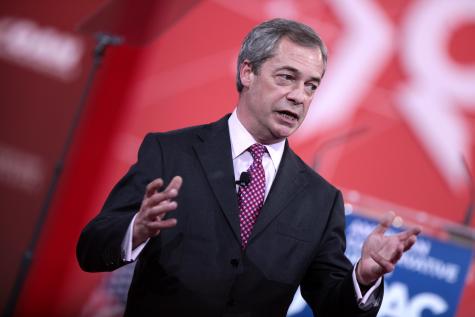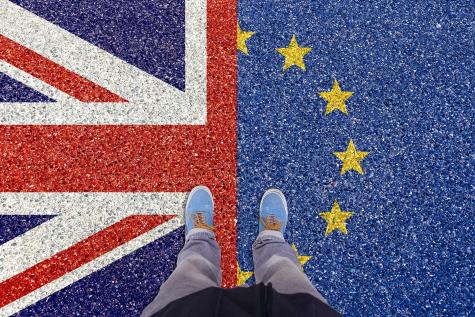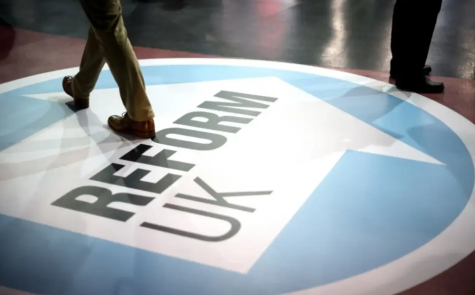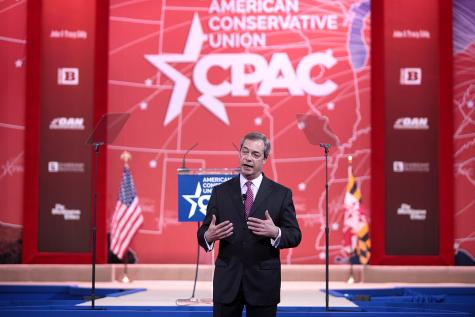Nigel Farage - MP

➡️ Nigel Farage – Reform UK Leader & the Man Who Broke Britain
Nigel Farage is a British political figure who leads the right-wing populist party Reform UK. Until 2018, he was the leader of the UK Independence Party (UKIP), and he played a pivotal role in the 2016 referendum that led to the UK's exit from the European Union.
Farage is a polarising figure, admired by some for his outspoken nature and criticised by others for his controversial views on immigration and the EU.
Jump straight to our resources on ➡️ Nigel Farage
Explore our comprehensive guides on -
-
The BREXIT Referendum & Political Fallout
-
Guide to British Politics

Farage & Brexit
Farage's influence grew significantly in the 2010s as he became a prominent voice in the campaign for the UK to leave the EU. His dedication to the Brexit cause and ability to connect with voters disillusioned with traditional parties propelled him into the spotlight. His tenure as a Member of the European Parliament provided him with a further platform to criticise EU policies.
His role in the Brexit referendum saw him labelled as 'the man who broke Britain'. Just hours after the Brexit result was confirmed, he admitted that one of their key pledges - £300 million extra for the NHS per week – was a mistake.
Farage was instrumental in building an atmosphere of fear by hammering down issues like sovereignty, immigration, and economic independence, which resonated with many Brits at the time. His relentless campaigning and media presence helped to keep the issue of EU membership at the forefront of political discourse.
His participation in debates and public appearances was marked by his straightforward and populist rhetoric, which were key in mobilising support for the Leave campaign. This was even more noticeable as the Labour Leader at the time, Jeremy Corbyn, remained neutral on the issue.

Reform UK
Led by Nigel Farage, Reform UK gained traction at the 2024 General Election, winning five seats propelling them into parliament for the first time. The party came in third place with 14% of the vote, after the Conservatives, who came in second place, and the Labour victors.
In the 2025 local elections, Reform UK made significant gains, winning almost half of the contested seats in mainly Tory-held councils. They won control of their first-ever councils and their first mayoral contests. When celebrating, Farage put his party ahead of the Tories as the leading contender to the Labour government.
Originally known as the Brexit Party, they changed their name in 2021 after Brexit had been completed to broaden their campaign platform. Campaign pledges in the 2024 election included:
-
Freezing non-essential immigration
-
Tax cuts for small businesses
-
Scrapping net-zero climate targets and green subsidies
-
Leaving the European Convention on Human Rights
Unlike other British political parties, Reform UK is a registered limited company. Until recently, Farage was both the director and majority shareholder, which gave him considerable control over party operations. This political business was labelled a one-man dictatorship, especially given that there was no internal leadership election placing Farage at the helm.
In order to appear more professional, in 2025, Farage gave up ownership. The newly formed nonprofit company was registered under the name Reform 2025 Ltd, with Farage and his deputy, Richard Tice, no longer as shareholders. The party are currently assembling their governing board.
Reform UK has been at the centre of a series of scandals, including several Reform members who had links to the British National Party (BNP). The candidates who have since been dropped posted xenophobic material on social media, showed support for the Nazis, made sexist comments against women and their right to healthcare, praised Russian President Vladamir Putin, criticised the transgender community, accused pharmaceutical companies of manufacturing the coronavirus, and denied the existence of climate change.
Reform have a complete disregard for climate policy and are guilty of promoting climate misinformation. Their latest offering to counter rising energy costs is to actually add taxes to renewable energy companies, ban battery energy storage systems, and force new grid infrastructure to be buried underground. It remains unclear how this would reduce energy costs and leaves their policy credibility in serious doubt.
Despite the parties' many failings, their popularity has continued to grow, partly due to the public's discontent with the Labour and Conservative parties. A shocking poll from February 2025 revealed that Reform UK are now perceived as both stronger and more trustworthy than the Tories.

Criticisms & Controversies
Farage has been criticised by many for his numerous side hustles. At a recent count, he has eight other sources of income on top of his role as MP for Clacton, which is, ironically, his worst-paid job.
He is a brand ambassador for gold investment firm Gold Bullion, a TV presenter for a show on GB news, a journalist at the Telegraph, and he can be booked for public speaking, appearances, and even personalised video messages.
He also earns substantial money using his influence through various social media channels, including YouTube, X, Instagram, and Facebook. Figures show that he has banked £571,585 from side hustles alone in less than half a year.
His active presence on social media and in the public eye gives him plenty of opportunities to promote his populist and Eurosceptic ideologies, as well as his well documented support for Trump. Present at his inauguration, Farage has made sure to strengthen his alliance with the U.S. president, bolstering his own political relevance at the same time.
Farage was also directly involved in the Cambridge Analytica scandal where 50 million Facebook profiles were harvested for data which was used to influence the Brexit referendum. Cambridge Analytica worked directly for Nigel Farage's pro-Brexit campaign group.
Farage has been accused of promoting divisive and xenophobic sentiments, particularly concerning his stance on immigration and multiculturalism. In 2016, his party's anti-immigration poster 'Breaking Point' became the centre of much controversy. It was compared to fascist propaganda and was blamed for inciting racial hatred.
Farage's outspoken views have proved polarising, but he has found success due to the rising popularity of right-wing narratives. In his eighth attempt, in 2024, he finally won a seat in Britain's parliament, pledging (or threatening) to challenge the general election 'properly' in 2029. As Labour and the Tories are increasingly afraid of losing voters to Reform, they are shifting their polices more and more to the right to appeal to a wider audience. The popularity of Farage and Reform UK have therefore helped to massively push British politics increasingly to the right.
Author: Rachael Mellor, 11.06.25 licensed under CC BY-SA 4.0
For further reading on Nigel Farage see below ⬇️
- Nigel Farage - Wikipedia467056
- Clacton (UK Parliament constituency) - Wikipedia467057
- Nigel Farage Coutts bank scandal (2023) - Wikipedia467058
- YouTube - Nigel Farage 417268
- Reform UK - Wikipedia467059
- Reform Party UK467060
- Nigel Farage - The New Statesman 497228
- Reform UK - Policies467061
- Nigel Farage - I News 502074
- It’s not ‘fantasy’: I know Nigel Farage abused people for their nationality – because I was one of themIt’s not ‘fantasy’: I know Nigel Farage abused people for their nationa…504497
- Farage accused of ‘parroting Kremlin lines’ after remarks on UK troops in Ukraine - Guardian 08.01.26503871
- ‘Of course he abused pupils’: ex-Dulwich teacher speaks out about Farage racism claims - Guardian 28.12.25502572
- Nigel Farage faces second investigation over claims he broke electoral law - LFF 18.12.25502499
- Welcome to the twilight zone where Nigel Farage can be accused of racism yet still lead the polls - Guardian 15.12.25501486
- Will Farage’s Trumpian strategy work against him? He has good reason to believe it won’t - Guardian 13.12.25501223
- Nigel Farage’s American dream - New Statesman 10.12.25503286
- Holocaust survivors call on Nigel Farage to apologise over alleged antisemitic comments - Guardian 05.12.25500161
- Farage goes to war with the BBC over presenter’s ‘Hitler’ comment - Politico 04.12.25500162
- I was targeted by Farage at school - this is why he should be exposed - I News 03.12.25502073
- Nigel Farage’s alleged teenage comments are a distraction from the damage of his politics - Conversation 28.11.25499727
- Twenty people allege he has a racist past. He denies it. Who’s telling the truth about Farage’s schooldays? - Guardian 22.11.25499271
- Nigel Farage: Britain Has Had 'Too Many Unifiers' - Bloomberg 24.10.25496151
- Farage insists ex-Reform UK Wales leader convicted of bribery is ‘bad apple’ - Guardian 10.10.25494519
- Nigel Farage now earns over £1 million from his 12 ‘second jobs’ - LFF 09.10.25494454
- The truth about the small-boats crisis - The New Statesman 08.10.25497227
- Could Nigel Farage really win the next election? Here’s what the polls say - Guardian 02.10.25491239
- We’re all obsessed with Nigel Farage now - The New Statesman 01.10.25497226
- Nigel Farage a ‘snake oil salesman’ comparable to Andrew Tate, says No 10 chief secretary - Guardian 30.09.25490869
- Young people’s favourite politicians? Farage, Burnham and Trump - The New Statesman 29.09.25497225
- Shabana Mahmood calls Nigel Farage ‘worse than racist’ over ‘dog-whistle politics’ - Guardian 29.09.25490870
- The Nigel Farage-ing of Britain is causing a terrible ripple effect - and families like mine are feeling it - Guardian 03.09.25485999
- Can Farage win in Scotland? | UK Politics | The New Statesman - The New Statesman 31.08.25488751
- Video: Farage Vows Mass Deportation By Scrapping Key Human Rights Law - Novara Media 26.08.25485916
- Historian Anthony Seldon criticises Nigel Farage and accuses Keir Starmer of 'flip-flop' - BBC Newsnight 25.08.25487361
- How long can Ofcom allow Nigel Farage to keep his own show? - Prospect 24.07.25482702
- Will Nigel Farage’s attempt to copy and paste Trump’s policies work in the UK? - Guardian 16.07.25480640
- Nigel Farage Has Mentioned Clacton Only Four Times in Commons - DeSmog 13.07.25479710
- Nigel Farage’s support has ‘topped out’, pollster claims - LFF 09.07.25479726
- From low attendance to little casework: Facts show Nigel Farage’s appalling record as MP - LFF 07.07.25479730
- Is Nigel Farage right about the Bank of England? - New Statesman 30.06.25487021
- With Friends Like These: Nigel Farage’s Year of Speaking at Radical Right-Wing Groups - DeSmog 15.06.25479707
- Why does Nigel Farage get to play British politics on easy mode? - Guardian 13.06.25474430
- Non-voters are Nigel Farage’s secret weapon - New Statesman 04.06.25474441
- Six big warnings about the rise of Farage - LFF 20.05.25470527
- ‘Guess who’s back?’: the inside story of Nigel Farage’s quest for power - Guardian 15.02.25471376
- ‘Nine jobs’ Nigel Farage gets 10th job earning £25,000 as Sky News Australia Commentator - LFF 10.04.25464678
- Nigel Farage sets up a new private company for Reform UK - LFF 20.02.25458131
- Nigel Farage Helps to Launch U.S. Climate Denial Group in UK - DeSmog 19.12.24446979
- Farage earns more than £1m a year for non-MP work - BBC 17.08.24428881
- Brexit voters have a negative view of Nigel Farage for first time ever, poll shows - LFF 12.08.24427835
- Here’s what you need to know about Nigel Farage’s mastery of TikTok - Guardian 02.07.24420948
- How has Farage fallen for the idea that the West provoked Russia? - Spectator 22.06.24422271
- The Nigel Farage effect is real - Politico 19.06.24419950
- Nigel Farage Is Coming for Your (Young) Man - Novara Media 17.06.24419145
- ‘He was a deeply unembarrassed racist’: Nigel Farage, by those who have known him - Guardian 14.06.24418817
- Nigel Farage says NHS should be abolished in its current form - LFF 07.06.24417935
- Who is Nigel Farage? - BBC 04.06.24417267
- UK right-winger Farage doused with drink at election campaign launch - Reuters 04.06.24417261
- Nigel Farage’s return means turbulence for the Tories - BBC 03.06.24417269
- Nigel Farage’s Anti-Climate Record - DeSmog 03.06.24417164
- Video: Nigel Farage Is New Reform Leader, Luke Akehurst Controversy - Turn Left 03.06.24417251
- Nigel Farage is the real star of the Tory conference - The New Statesman 03.10.23497236
- Senior Tories risk losing seats if Nigel Farage returns to politics, experts say - Guardian 25.12.22321921
- Nigel Farage - official467063
- Nigel Farage - tiktok467065
- Nigel Farage - x467064